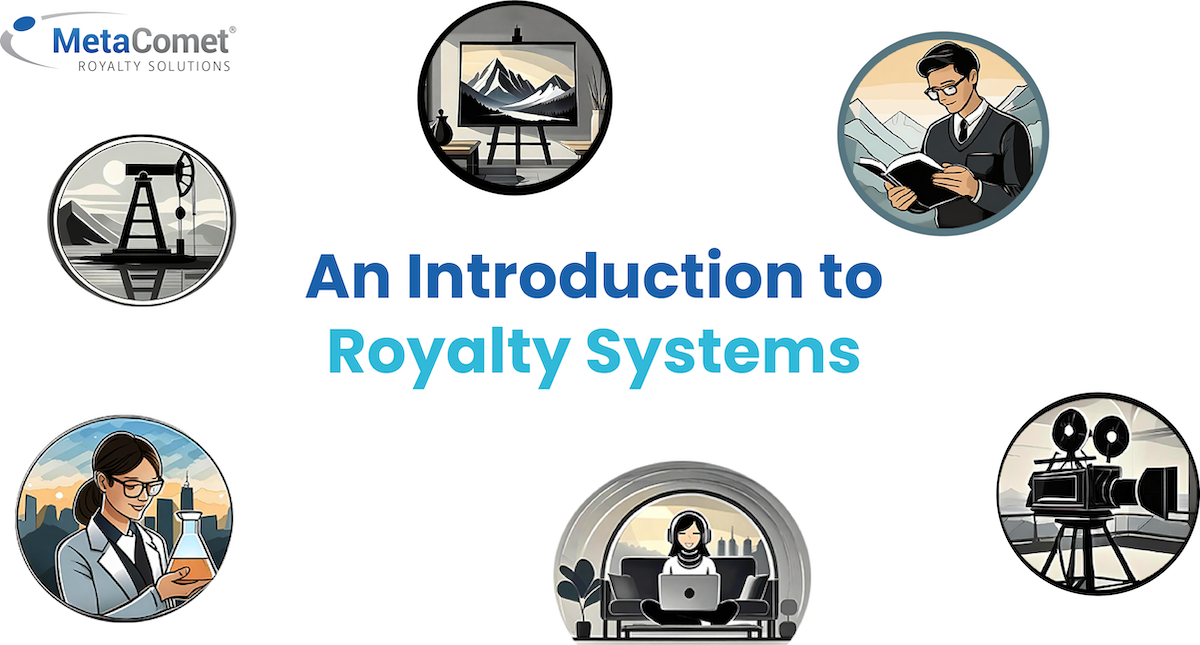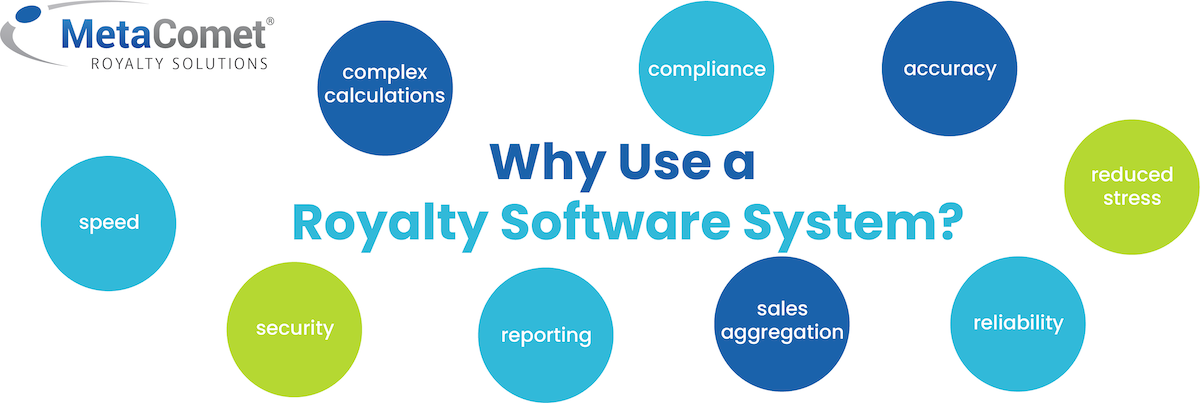An Introduction to Royalty Systems
The system of paying royalties is a method of sharing the costs and sharing the profits of marketing and selling something. This article dives into how royalty systems work, and the best ways to calculate and track royalties. Royalties are paid to property owners for minerals beneath their land, and to inventors, songwriters, musicians, and authors. A farmer who learns that there is oil on his land may not have the money to drill a well, pump the oil out of the ground, and ship it to market. An oil company will have the infrastructure to do these things. The farmer and the oil company will come to terms on a contract. If the farmer does not take a lump sum for the right to extract minerals from his land, he will receive a percentage of the revenue derived from the sale of the oil extracted from his land. This percentage of revenue or profit is called a royalty.
How Does a Royalty System Work for Intellectual Property?
The same type of royalty system works for intellectual property, such as patents and copyrighted works of art. An inventor may not have the means to manufacture an invention. The author of a book may not have the means to have his or her book printed, or to make sure that reviews are printed in newspapers. The author or inventor makes a deal with the manufacturer or publisher to give them the rights to their intellectual property in exchange for a royalty, or percentage of future sales of a device or title. Ensuring that royalties are paid accurately and in a timely manner has always been challenging. Much data must be collected, stored and updated. Simple spreadsheet systems are usually insufficient for the task, as different businesses have specialized types of data they need to use. If an oil company cannot accept a tank of oil from a property owner because it contains too high a concentration of paraffin, royalty calculations must be adjusted. Record labels must track not only sales of a recording, but also how often the recording is aired on radio stations or used in advertising. They all may need to track royalties to co-authors, agents and heirs. If advances are paid, royalties will need to be withheld until the amount of an advance is covered. Specialized royalty accounting software can help mining companies, manufacturers and publishers deal with all of these variables. Some royalty software is somewhat general, and can be configured for different types of businesses that pay royalties. Others are more specialized, so that an oil company will use different software than a record label. The degree of specialization depends on the scale of the business and the programming skills of a company’s IT department.
Why Use a Purpose-Built Royalty Software System?
13 Reasons.
Smaller companies often start off by managing royalties with homegrown royalty systems, relying on spreadsheets for tracking, calculation, and reporting. While spreadsheets may seem like a cost-effective and familiar solution, they quickly become unwieldy, error-prone, and labor-intensive as royalty complexities grow. A purpose-built royalty management software system offers substantial advantages over a system of spreadsheets. Let’s explore the key benefits and why it’s the smarter long-term investment.
1. Handling Complex Calculations
Royalty calculations often involve a mix of variables like tiered percentages, escalations, and advance recoupments. A homegrown spreadsheet solution may handle simple calculations, but as contracts become more intricate, the risk of errors skyrockets. A purpose-built royalty management system is designed to perform those calculations in a single step with minimal user input.
2. Standardized Rules and Contract Structures
A purpose-built system has built-in functionality to manage standardized royalty rules. These solutions can easily accommodate various contract types, with a very simple setup process. Spreadsheets, on the other hand, require manual customization for each unique case, leading to inconsistencies and room for error.
3. Compliance
Royalty systems are dynamic and complex, so it’s crucial for all stakeholders to have transparent views of how the royalties are calculated. When faced with an audit the last thing a royalty manager wants to do is scramble to gather information from disparate and opaque sources, such as a collection of spreadsheets. With a dedicated royalty management system, all the data and calculations are stored, accessible and securely, in one place, so they can be easily reviewed and audited.
4. Accurate, Timely Statements
Generating royalty statements manually through spreadsheets can be tedious and time-consuming. It often requires pulling together data from multiple sources, increasing the risk of omissions and inconsistencies. A purpose-built royalty system automates statement generation, ensuring they are accurate, professional, and delivered on time. No matter how frequently and rapidly your royalty statements need to be generated, the software can process thousands of sales files, product records, and payment files effortlessly, freeing your team from manual drudgery.
5. Insightful Reporting
Royalty software goes beyond basic number-crunching; it offers advanced reporting capabilities that can provide actionable insights into your sales and revenue. Real-time data analysis and easy-to-generate reports give you a holistic view of your financial performance. In contrast, spreadsheets often require advanced skills to generate even the simplest reports, and extracting insights can be an overwhelming task. Royalty management software makes data-driven decision-making and planning fast and efficient.
6. Sales Data Aggregation
Sales data flows in from multiple channels—physical stores, online platforms, and international markets—and in multiple formats and currencies. Standardizing these incoming reports and manually tracking and updating sales figures in spreadsheets can lead to confusion, delays, and errors. The best royalty management software systems include a “sales aggregator,” which converts foreign currencies and standardizes sales data for accurate and hassle-free royalty calculations.
7. Royalty Recipient Portals
Transparency and accessibility are vital for fostering trust between organizations and individuals doing business in the royalty space. Royalty management software often integrates with a secure royalty portal, giving recipients instant access to real-time royalty statements and payment information. This reduces the need for constant inquiries and builds stronger relationships. Spreadsheets, of course, offer no such functionality, and manually sharing data can be a security risk.
8. Enhanced Security
Speaking of security, safeguarding sensitive financial information is critical. Homegrown spreadsheet systems lack the advanced security features required to protect confidential royalty data. Quality royalty system software is built with encryption, secure user authentication, and role-based access control, ensuring that only authorized personnel can access sensitive data. This mitigates the risk of data breaches and builds confidence among your stakeholders.
9. Automated Payment Files
The complexity of managing payments can be overwhelming. A homegrown spreadsheet system requires the time-consuming manual creation of payment files. Royalty management software automates the generation of payment files, ensuring timely and accurate payments with a fraction of the effort.
10. Interoperability with Other Systems
Modern royalty management software is built to integrate with your existing business systems, from accounting platforms to ERP tools. This interoperability allows seamless data flow across your organization, reducing redundancies and the need for manual updates. Homegrown systems typically require time-consuming data manipulation, which can lead to data discrepancies and inefficiencies.
11. Time Savings
Perhaps the most tangible benefit of a purpose-built system is the time it saves your team. Manual tracking, calculating, and reporting in spreadsheets can consume countless hours. Purpose-built royalty software automates these tasks, freeing up your staff to focus on higher-value activities. This increased efficiency can translate directly into cost savings and greater productivity.
12. Reliability
Spreadsheets are notoriously fragile. One accidental keystroke can lead to broken formulas or corrupted data, jeopardizing the accuracy of your royalty calculations. A purpose-built system, on the other hand, is designed for high reliability. It undergoes rigorous testing to ensure it can handle large volumes of data without crashing or breaking down, giving you peace of mind.
13. Reduced Stress
Managing royalties through spreadsheets can be stressful, especially as the scale of your business grows. Errors, compliance risks, and manual processes can lead to late nights and constant pressure. A dedicated royalty management system reduces that stress by automating the most tedious and error-prone tasks, allowing your team to operate with confidence and clarity.
A Smarter Long-Term Investment
While spreadsheets may seem like an inexpensive option at first glance, they quickly become a costly liability as your royalty system needs grow more complex. A purpose-built royalty management system is a better investment in terms of accuracy, time savings, compliance, and overall peace of mind. It not only helps you manage today’s royalty challenges but also scales with you as your business grows, providing lasting value and reliability. Investing in a dedicated solution ensures that you’re not just paying royalties—you’re optimizing them for future growth and success. MetaComet® Systems provides purpose-built royalty management solutions including Royalty Tracker®, widely recognized as the gold standard for royalty management in the publishing industry. Is it time for you to consider a dedicated royalty information system? Contact us today for a discovery call or demo, and to learn whether our solutions are right for your business.

David Marlin is the President and Co-Founder of MetaComet® Systems, a prominent provider of royalty automation tools. Since founding the company in 2000, David has spearheaded the development of a suite of best-in-class systems that effectively facilitate royalty processes for nearly 200 publishers. David has also served as the chair for The Book Industry Study Group’s Rights Committee and Digital Sales Committee.
Before establishing MetaComet Systems, David served as a technology consultant for renowned publishers, collaborating with notable companies such as Random House, Penguin, HarperCollins, Holtzbrinck, Macmillan, Scholastic, Time Warner, and many others. David holds both an MBA and a BA from Columbia University in New York.
Contact Us
"*" indicates required fields



